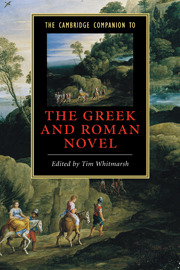5 - Class
from Part I - Contexts
Published online by Cambridge University Press: 28 June 2008
Summary
Where do we pitch the novels, in terms of social class? This is a more difficult question than is often admitted. The authors, to begin with them, can rarely be pinpointed demographically. The Latin novelists were no doubt high-powered individuals: Petronius was probably Nero's courtier, and Apuleius' father - a duumvir or chief magistrate in his city of Madaurus - was rich enough to leave his sons the hefty sum of 2 million sesterces (Apology 23.1). The Greek writers are, however, more shadowy. Chariton describes himself as 'from Aphrodisias, a clerk (hypographeus) to the rhetor Athenagoras' (1.1.1): even if this is biographically true - and there is good reason to suspect an erotic novelist who styles himself 'Charming, from the City of Aphrodite' - it is hard to guess except in the broadest terms what kind of echelon such a professional occupied in first-century CE Aphrodisias. Heliodorus' descent 'from the race of the sun' (10.41.4) looks like a claim to hereditary priesthood, but the same uncertainties apply. If Heliodorus, and Achilles Tatius with him, did indeed become Christian bishops (as later tradition maintained), then they can hardly have been socially insignificant, but the chances are that these reports are fictions. Finally, Iamblichus, whose Babylonian Affairs survives only in fragments and summary, is reported in a late source to have been born of slaves, although this notice has been suspected, with some justice.
- Type
- Chapter
- Information
- The Cambridge Companion to the Greek and Roman Novel , pp. 72 - 88Publisher: Cambridge University PressPrint publication year: 2008
- 20
- Cited by

